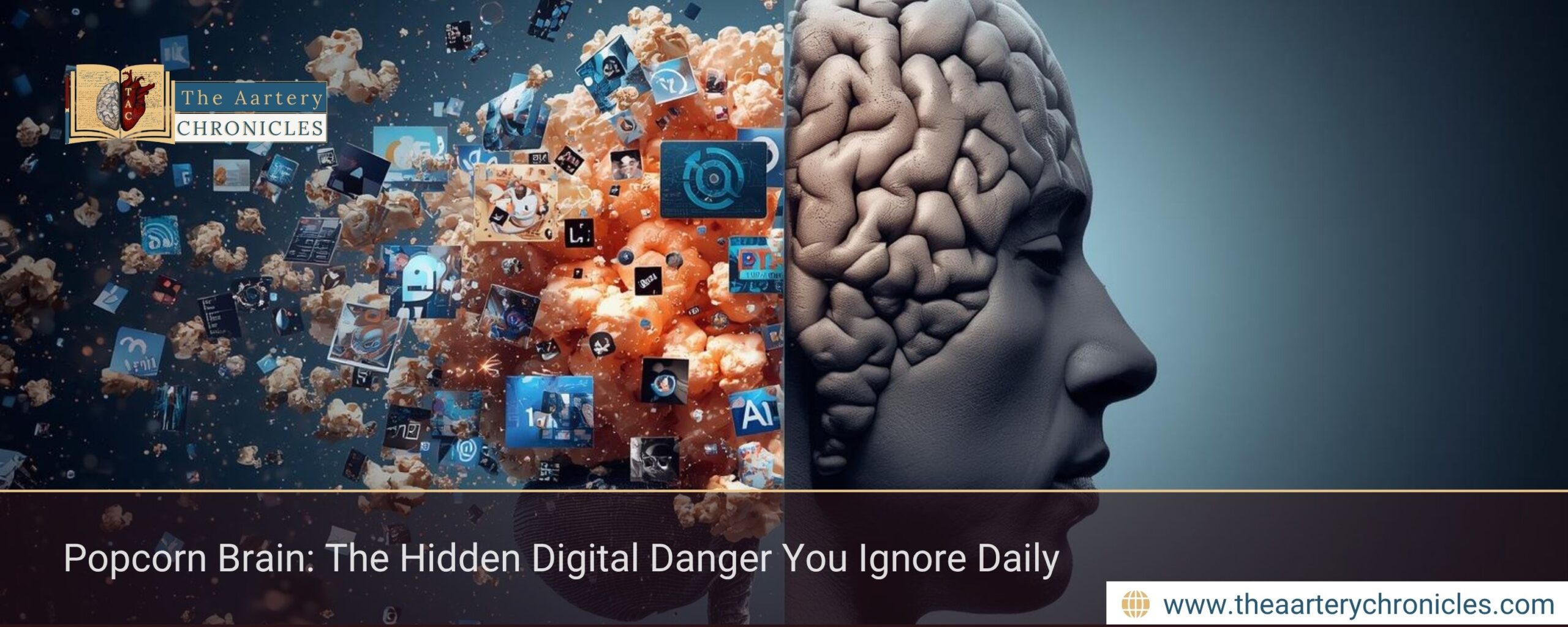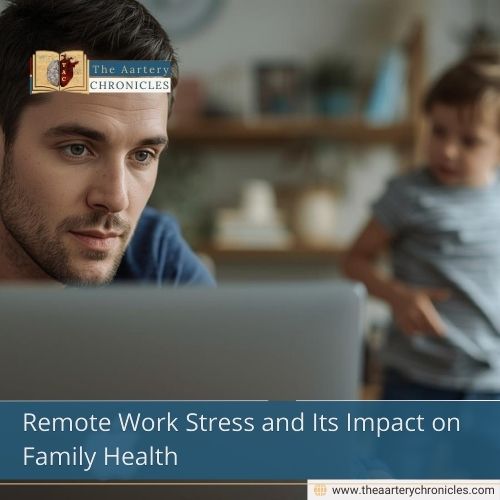

Popcorn Brain: The Hidden Digital Danger You Ignore Daily (Part- 1)
Technology never ceases to amaze, what with the addiction to social media platforms, which are churning out content like never before. The content is so involving that, before you know it, you’ve been doomscrolling for more than one hour! Watching reels, checking your WhatsApp messages, replying to emails, playing games, watching shows, and much more are done with the help of digital devices.
What Is Popcorn Brain Syndrome
So much so that the continuous speed with which we skip between the various social media platforms is mind-boggling. In comparison, daily life activities seem slow and boring.
The term Popcorn brain was coined around 2011 by researchers of the University of Washington who were studying how digital media usage trains the brain for constant speed.
According to a 2021 paper in Frontiers in Psychology, prolonged smartphone use among teens and young adults leads to altered emotional balance, poor attention spans and structural brain changes. It reports that constant digital input can reshape/rewire the working of the brain.
According to a 2019 study published in Nature Communications, our attention span is greatly impacted due to information overload, thanks to digital media.
Like the popping of popcorn, we ‘pop’ from one media platform to another, in a matter of seconds, hence the term Popcorn brain.
Impact of Popcorn Brain
Popcorn brain is the constant urge to navigate across social media platforms, and it has a major impact on our health.
- Reduced Attention: Popcorn brain reduces our attention span, as we mindlessly keep switching between various media platforms. We find it difficult to focus and concentrate on our basic activities, whether work-related or home-related. We are restless and unable to concentrate as we require some stimuli to reduce boredom or restlessness.
- Addictive: Popcorn brain is addictive, as we find it difficult to let go. If we put the mobile down after checking WhatsApp messages, barely a couple of minutes pass, when the phone is in our hands and we are checking out some reels on Instagram.
- Stress: The constant information overload increases stress and is overwhelming, like flailing our arms in a pool.
- Validation: We tend to seek validation for all we do, be it at work or at home. Similarly, we seek online recognition in all our social media interactions. Writing a post and feeling a sense of happiness when it garners numerous comments from others is one such validation. The instant feedback increases the dopamine levels and activates our brain. This creates the habit of instant validation, but in real-life scenarios, instant gratification does not happen. You are recognised for your hard work, no doubt, but it takes time and patience to reach there, unlike the number of ‘likes’ our post garnered in half an hour.
- Feeling Busy: This is the art of feeling busy without actually achieving anything, while multitasking. The lack of concentration on a particular task for long leads to multitasking, i.e. taking on various tasks at once, instead of focusing and completing one task at a time. You are so busy with multiple tasks that at the end of the day, not even one is completed successfully.
- FOMO – Fear of Missing Out: The fear of missing out (FOMO) is what drives us to constantly keep checking the notifications, newsfeed and communicate via social media platforms. We need to be aware of all the goings-on and stay updated.
- Thought Process: Scrolling through internet platforms rapidly, jumping from one platform to another, in a matter of minutes, impacts our cognitive functions. We are unable to analyse and think rationally / logically about the task at hand.
- Memory: It becomes difficult to keep in mind or remember information. This impacts students the most, as they are unable to learn and remember their lessons. We rely on digital apps for basic information that we should actually know through our experiences.
- Poor Academics: The incessant use of social media is hampering the academics of students. They are unable to concentrate, focus and learn. They fare poorly in exams, feel demotivated and show a decline in their academic performance.
- Relationships: Relationships suffer as all the family members, instead of conversing with each other, have their heads buried in their phones. Online instant messaging services like WhatsApp and Messenger have taken the place of face-to-face personal relationships and meaningful conversations and discussions. The height is when a teen (in his bedroom) phones his mother (who is in the kitchen) instead of simply walking from his room to the kitchen. Talk about laziness!
- Psychological Health: Popcorn brain causes psychological issues like stress, anxiety and depression. The need to stay in the loop harbours feelings of unease, stress, anxiety and inability to cope and manage situations, often leading to depression. This feeling lowers self-esteem and confidence, fosters fear of inadequacy, causes restlessness and plays havoc with psychological health.
- Physical Health: Popcorn brains impact physical health, too. Prolonged use of digital devices causes eye problems like dry eyes/red eyes/blurry vision; aching fingers, stiff neck, back and shoulder muscles; poor posture; poor blood circulation leading to swollen feet, health issues like constipation, insomnia, gastric issues due to poor meal times/binge eating/processed food snacking, all of which invite chronic diseases like obesity, high blood pressure, diabetes, cardiac issues; inadequate hydration or excessive consumption of coffee/sugary colas lead to dental issues like dry mouth/bad breath/gum problems. It also makes us lazy and lethargic as we don’t want to get out of bed, as we are busy watching online content, and therefore unable to complete our daily chores/activities. So much time, all wasted online!
- Work Issues: Popcorn brain impacts our work life. We are unable to focus and complete our tasks within the prescribed time limit. We are distracted and long to get back to our doomscrolling. Lunch breaks and tea breaks are spent hunched on the mobile instead of actually really chatting ( as in talking) with colleagues. This hampers relationships with colleagues and superiors as we find it difficult to convey our work-related thoughts and feelings to them. In our hurry to get the task completed, we overlook certain mistakes that we did not cross-check, thereby angering our superiors, who give us a good talking-to in front of the entire office.
- Behaviours: Popcorn brain causes behavioural changes like restlessness, boredom, constantly moving from one app to another, inability to avoid app notifications, feeling the urge to leave your ongoing task and pick up the phone instead. Short-term gratification, we can say, will get us nowhere. This erratic behaviour slowly turns into a habit, leading to addiction.
- Tiring: Popcorn brain is taxing and tiring. We are unable to relax completely as the urge to check the phone notifications is always present. It makes us impatient, irritated, increases mental fatigue and demotivates us. We are under stress all the time and unable to let go and relax.
Source: Inputs from various media Sources
- Rupal Sonpal
- Health News and Updates,People Forum
- 17 November 2025
- 11:00








